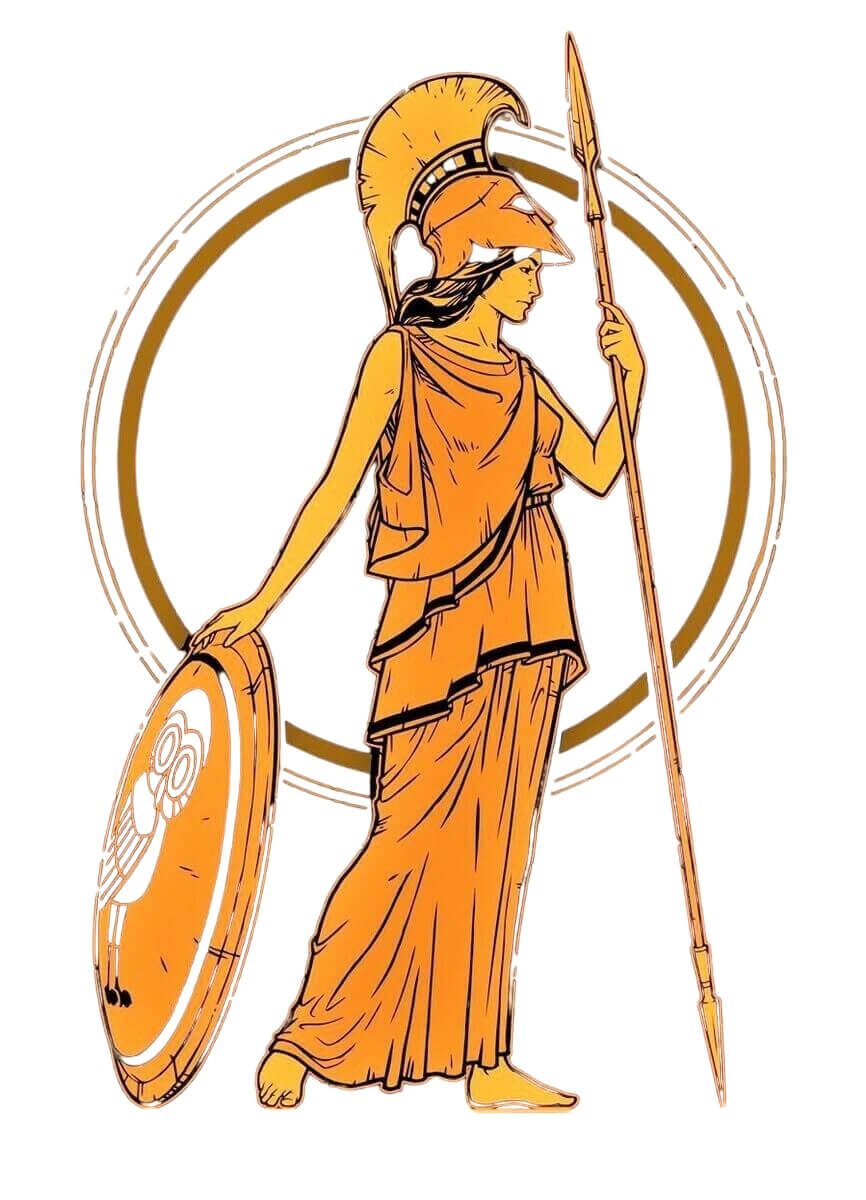Artemis: Greek Goddess of the Hunt and Nature
In Ancient Greek Mythology the goddess Artemis is the mistress of nature, hunt and wild animals. She is the Babel Tower (Rook) of Natural World in Chaturanga, inasmuch as the world itself could come to an end, if the environment is seriously damaged. According to ancient myths, Artemis is the sister of Apollo and daughter of Leto and Zeus.
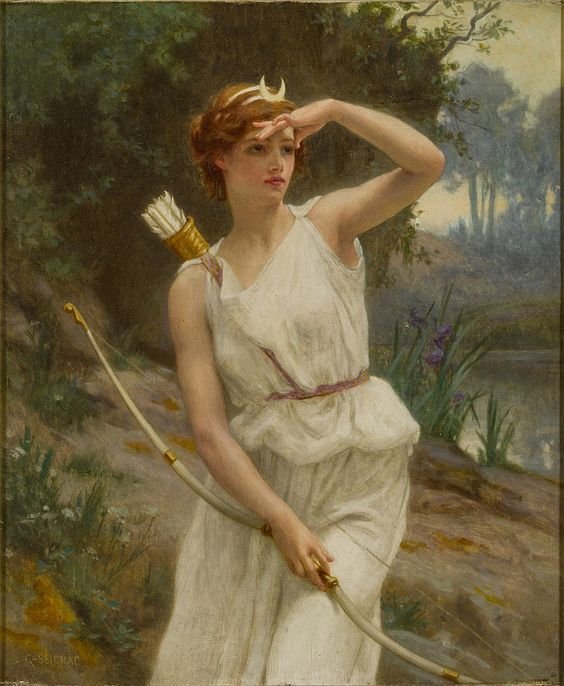
The birth of Apollo and Artemis
The goddess Artemis is the jovial and quick–witted twin sister of Apollo. Always in her springtime of life and fond of archery, she is the green spirit and shrewd protector of wildreness. Her father is the thunderer Zeus, and her mother is the beautiful titan goddess Leto.
Daughter of the titans Coeus and Phoebe, the mother of Artemis was the early and favourite lover of Zeus. However, the thunderer was married to Hera, when Leto was pregnant of the twins. As a consequence, the olympian queen went into a rage against Leto, and invented a fiendish sort of revenge. Full of jealousy and anger she condemned her to wander around the world, finding no shelter for the imminent birth of her children.
Hera threatened the Greeks and obliged them to deny refuge and unwelcome the goddess. Hence she had also sent the terrible dragon Python in order to exasperate and exhaust Leto day and night. From edge to edge Python chased the unfortunate goddess, and no country, or island dared to shelter her. Insomuch as all them had been terribly afraid of Hera and her dreadful monster.
Nonetheless one day the mother of Artemis had found a refuge on a small floating island, named Asterios. In those days it hadn’t been connected to the land and stayed out of Hera’s veto. Thus, it was on this islet there she gave birth. The goddess Artemis was born first, and her brother Apollo longed nine days to abandon his mother’s womb. Considering that Hera had also delayed Eileithyia, the goddess of childbirth. The little Artemis helped her mother in labor and softened her pain. Since that moment on and in addition to her status of huntress, protector of greenwoods and iridescent woodlands, Artemis had also become the helper of women in labor.
The miraculous appearance of Delos
All nature rejoiced at the birth of divine children, and the island of Asterios stopped at the very place where Leto had given birth. Hence its land, previously barren, had been covered with colorful flowers and viridescent greenery, and the island itself received a new name – Delos (from the Greek word for “visible”). Leto kept her promise: Apollo’s birth moored the island to the earth and filled its air with ambrosial fragrance. Thereupon it became a sacred place of worship, which extoled the god of music and his sister the goddess Artemis. In fact, the island had one of the most important shrines consecrated to Apollo.
Artemis’s wish
It is said that when the goddess Artemis was three years old, she was sitting on the lap of her father Zeus, while he asked her about the gift she would like to receive. Artemis demanded eternal virginity, so many names as her brother will hold, a bow and arrows, the duty of bringing light, sixty oceanids to make up her retinue, twenty nymphs to feed her hunting dogs, and all the mountains in the world. The goddess Artemis had also requested Zeus to bestow an entire city on her, so that she could be honored in it above all the gods.
Zeus fulfilled everything according to her wishes. Artemis became the third and last virgin goddess in Olympus. Henceforth she had so many names as her brother, perhaps more, than him. She was called “The Mistress of Animals”, “She of the Wild” “Arrow-pouring” and “deer-shooting”. Artemis had been often depicted bearing a torch, thus there also had been the epithet of “torch-bringer” and “bright”. Her splendid bow and arrows had been crafted by Cyclopes in the forge of Hephaestus. Afterwards she fired her first arrows towards the trees, the third into an animal, and the fourth had been launched on the city of evil. There lived sinful iniquitous people, who never knew about the notion of justice.
Ephesus – the city of Artemis
As for the cities in which she would be honored, Zeus had exceeded the expectations of his young daughter. Inasmuch as not only one city extoled and venerated the goddess Artemis, but so many as thirty. On the other hand, in many more towns and villages she had an important share in sacrifices.
Nonetheless, the main city of Artemis was the Asian city of Ephesus, located on the territory of modern Turkey. Artemis of Ephesus was one of the most famous goddesses in the Hellenic world. As a matter of fact, the Greeks dedicated this magnificent marble temple to her springful purity and blooming buoyancy of the year.
The inhabitants of Ephesus had been building the sanctuary more than one hundred years. As a consequence, it was one of the most splendorous and unequalled temples in the ancient times. Thus it became to be considered as one of the Seven Wonders of the World. Unfortunately, its glorious beauty longed less than expected since it was burnt by a crazy culprit in one single night.
Herostratus sets fire to the temple of Artemis
One ordinary Ephesian man named Herostratus, distinguished only by his mad, wistful longing for fame, decided to become well-known, destroying the temple of the goddess Artemis. Thus, one night he set fire to the wooden roof-beams of her sanctuary in Ephesus. Of course, Herostratus received the punishment he deserved, having been tortured on a rack and executed by Ephesian guards. However, such a punishment was not enough, thus the Ephesian authorities had also issued a very ruthless law. It forbade everyone to mention the name of Herostratus, under penalty of death. Nonetheless it turned ineffective, and Herostratus became an eponym of a criminal in search of renown and stardom. “Herostratic fame” prevailed over its own obscurity, and the arsonist himself was remembered, as well for his cosmic coincidence. Because he burnt the temple of Artemis on 21 july 356 B.C.E, the day when Alexander the Great had been born.
Artemis as the patroness of wildlife
When the goddess Artemis received vast mountains from Zeus, she also became the mistress of the Greek woodlands, and of all the animals and creatures that inhabited its splendid surroundings. Sometimes she hunts the deer and hares, relishing the hunt and her skillful archery. Even though she also makes sure that no one hurts the animals in vain. She helps the hunters, and ensures that the number of prays doesn’t decrease. Therefore, she always looks after their new offspring. However, the goddess Artemis protects not only the wild beasts and its life. She also takes care of everything that lives on earth, grows in the forest and blooms in the field. That is, herds of farm animals, people, plants and birds.
Artemis fosters the lavish and splendorous growth of the herbs, flowers and trees. Furthermore, she also blesses births, weddings and marriages. Beautiful as a clear shining day, with a silver bow and moonlight quiver on her shoulders, the goddess Artemis wanders merrily through the wild woodlands and florid fields. In fact, she has a favorite animal among the wildlife – a gorgeous, charming doe. The goddess seemed to be especially fond of her, thus the doe began to be frequently depicted next to her.
As the twin sister of Apollo, Artemis loves not only bows, arrows and hunting. In addition, she also relishes music and dance. The astonishing sounds of lyres, vertiginous round dances with nymphs and their ebullient jubilation fill her heart with rapture and bliss. In the evening, if the moon is shining bright, Artemis and the nymphs hold each other’s hands and dance until late in the blooming forest glades.
Sometimes the goddess Artemis and her friends climb the cherished paths unto the top of Mount Parnassus, where Apollo likes to visit. Thereafter, tired of hunting, the young warrioress puts aside her silver bow and listens the sweet rhapsodies of Apollo. Artemis and her brother are never at odds; they treat each other with kindred tenderness. Moreover, they love fervently their mother, Leto, letting no one to disgruntle her. Together they punished the wild giant Titius, who treated her harshly. In addition they also took a ruthless revenge on arrogant, rancorous Niobe.
The goddess Artemis and Proud Niobe
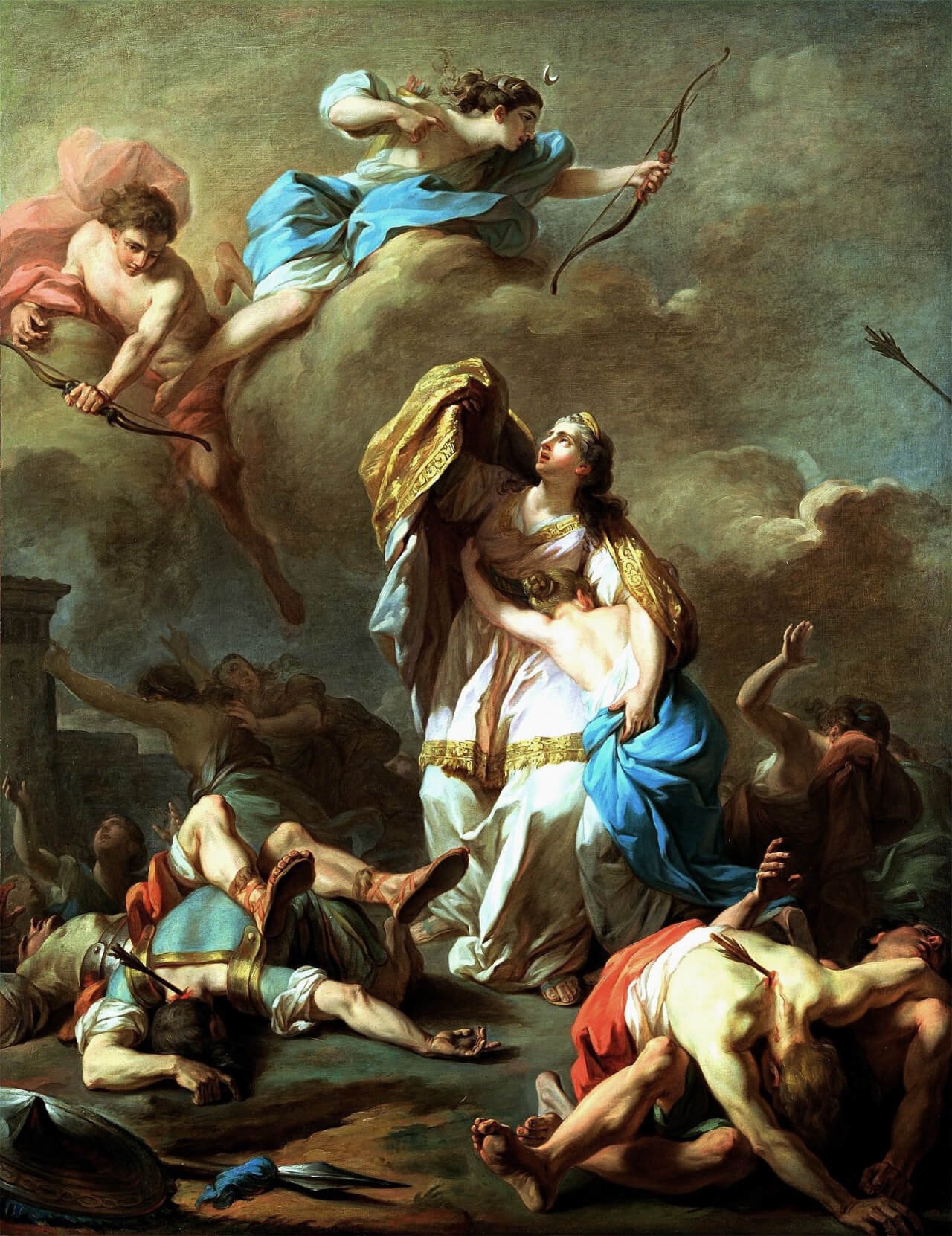
Niobe was the wife of king Amphion of Thebes, daughter of Tantalus and Dione. She had seven sons and seven daughters, so handsome and beautiful as young gods. By the time the women of Thebes were about to offer rich sacrifices to Leto, Niobe scorned their oblation. Thereupon she boasted about her superiority to the goddess and proposed herself as the new subject of worship. She bragged that she was the queen, that she had more children than Leto and was more beautiful than her.
When Leto heard such a kind of arrogant defamations she felt very saddened. She didn’t want to complain to anyone about her offense, but Apollo and Artemis noticed their mother’s grief. For a long time, they did’nt know about the reasons of Leto’s upset, but finally found out about the slanders. Leto wept bitterly, while telling the story, thus fury and anger flared up in their hearts.
Relentless and fearsome, the twin gods went to Thebes in search for Niobe. They decided to avenge their mother at any cost and yarned for a merciless revenge upon her defamers.
The death of Niobe’s sons
Just at that time the Theban youths began competing in agility on the field outside the city. Meanwhile two sons of Niobe were riding their swift elegant horses and stayed far ahead of their rivals, the bowstring of Apollo’s bow jangled as a fury of sun and they fell down from their horses to earth, struck by the golden arrows. Straight away another two found death. They had been struggling with each other and their bodies were closely intertwined. So Apollo used his opportunity and pierced them both with one single arrow. One by one, all the sons of Niobe had died. The youngest of them begged for mercy and Apollo wanted to forgive him, but he could not take back his deadly arrow. It struck the young man right in the heart.
Artemis kills Niobe’s daughters
The news of the death of her sons reached Niobe. Shortly thereafter she rushed to the field with her daughters, saw the breathless bodies and cried in despair. Her heart was torn with grief, but she didn’t humble herself, and defamed the immortal goddess again. “Rejoice, cruel Leto, you deprived me of half of my children! But even now I am happier than you, I still have more children than you!”
Just when Niobe had fallen silent, the bowstring rang again. The goddess Artemis launched a terrible, piercing arrow, meanwhile Niobe’s daughters stood in a mournful silence around their breathless brothers. Suddenly, without even a cry, one of them fell down dead, afterwards the second, the third … Artemis fired six arrows, leaving alive only the youngest daughter of the queen. Poor Niobe tried to hide her in the folds of her clothes, begging Leto for mercy. However, she exclaimed her belated pleas in vain. At the same time the goddess Artemis shot down the girl, right in the arms of her mother.
The eternal tears of Niobe
After having learned about the demise of his children, Niobe’s husband, stabbed himself to death with a sword. Therefore Thebes had lost their king and the heirs to the throne. The queen Niobe stood mournfully over the bodies of her entire family. She had lost all those people whom she had cherished in life.
In fact, she was numb with grief and felt deep sorrow. The wind did not ruffle her hair. Her eyes did not shine with life anymore and nothing could blast her oblivion. Only frequent large tears fell from her eyes to the ground, one drop after another. The grieving Niobe stood this way for a long time thus the gods finally had mercy on her. They turned her into a stone.
One day a scorching gust of wind came forward and carried Niobe back to the homeland, in the country of Lydia. Thereafter the rock, which looks like a person is still standing there. Surprising drops of water are trickling out of it. These are the eternal tears of Niobe falling down to the Earth.
The Goddess Artemis and people
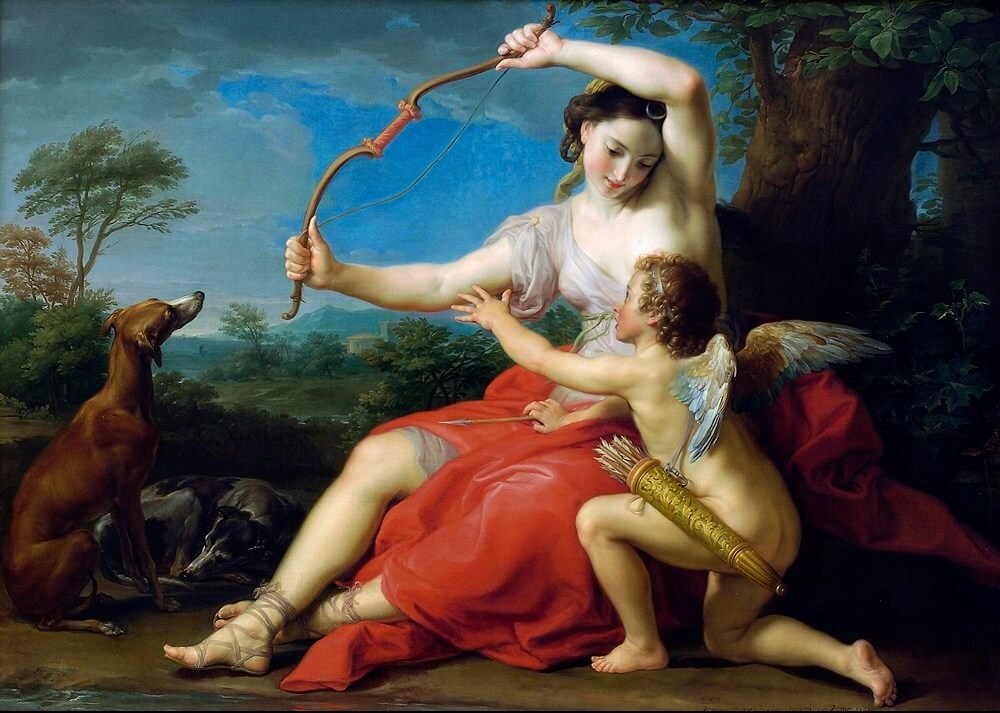
The goddess Artemis has a fame of harsh and merciless, many times she acts without forgiveness, showing no compassion to her foes and offenders. As a matter of fact, according to the ancient myths, Artemis doesn’t know leniency, if someone tries to disrespect her.
Greek mythology is full of stories about the cruel punishments, perpetrated by the goddess of wild nature. Sometimes deservedly, and sometimes not, people had undergone them and suffered the cruel consequences. As an example, the goddess Artemis was a self-declared virgin and never tolerated the emotion of love. She always abhorred her companions marrying, having children or someone trying to be her swain.
The goddess Artemis and Callisto
One day Zeus fell in love with one of Artemis’s nymphs, Callisto. When time had elapsed and Artemis noticed that Callisto was expecting a child from Zeus, she became very furious. For such an offense to the principles of chastity, she banished the nymph unto the mountains. When a time afterwards she gave birth to a son, named Arcades, Artemis became even more enraged, and turned Callisto into a she-bear.
Henceforth many years faded away. Arcades grew up and became a renowned hunter, able to use his bow and spear as a true warrior. One day in the forest he met a big fearsome bear, which looked familiar, but dreadful and aggressive at the same time. Arcades decided to slay the she-bear, and was ready to give her a fatal blow, ignoring that his mother Callisto was in front of him. However, Zeus could not allow the death of his beloved and such a kind of terrible matricide. He protected Callisto from Arcades and took them both into the sky, transforming them into the constellations of the Big and Little Bear.
Artemis and Actaeon
The goddess Artemis had also punished very cruelly the hunter Actaeon. Once, chasing the deer in the forest, he accidentally ran into the place where Artemis was bathing. The She of the Wild had definitely lost her temper. Actaeon beheld something that no one should espy, neither gods nor people. Thus he deserved to stay speechless and suffer for the rest of his life! Therefore, the unhappy hunter was immediately turned into a deer.
Meanwhile in the greenwood the hunt was in full bloom. Actaeon’s friends, accompanied by their dogs were chasing the beasts along the forest. Among their dogs they had the Actaeon’s pack of canines. They were the best, the fastest, and the most frightening. For sudden, a deer flashed ahead, and immediately all the dogs rushed after it in crazy pursuit. Of course, Actaeon’s hounds were the ones, which dashed ahead of all others.
Just in a moment they caught up with the deer. Hence they surrounded it as every other pray, clung to it and tore it apart into pieces. The hunters approached the defeated beast, marveling at its size and beauty. Obviously they regretted that Actaeon had disappeared somewhere and could not see their success. No one noticed that the eyes of the dying beast oozed human heartbreaking tears. That’s how the goddess Artemis punished Actaeon, for his accidental sin.
The goddess Artemis: Meaning and symbolism
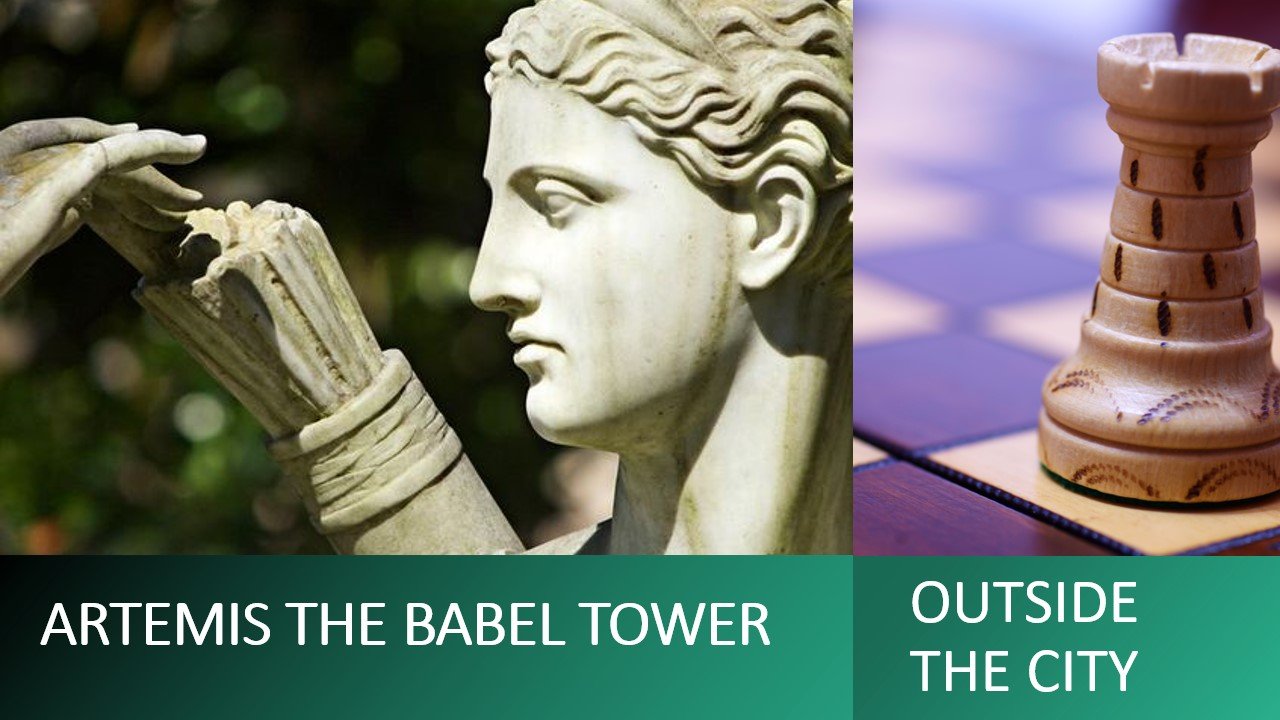
However, if someone treats Artemis with reverence, she can change from anger to mercy. For example, at the request of Apollo she pardoned the King Admetus, when he forgot to bring his atoning sacrifices after having married Alcetis.
Artemis had filled his bridal bedroom with snakes, but in the same moment, when Apollo required an offering from Admetus, she made the snakes disappear. That is, the emerald flora of woodlands always hated the weak and pathetic idealists, unable to win a competition by their own. The nature never needed to follow the rules of hateful, detestable humans.
As a matter of fact, the olive green and the blooming flowers of spring, the mountains and forests, the rivers and wind don’t need to demonstrate anything to a simple ungrateful man. They can kill him in any moment. Her name is Artemis – The Babel tower of Natural World, the rook in Athena’s political system of chess.
Thenceforth and as a patroness of wildlife, the goddess Artemis is not only protective with her wondrous green realm. In fact, she is fond of dead evil humans; the end of their pathetic tragedy is certainly beautiful.
If there is a certain exaggeration or misjudgment about one of them, no one would care. Since it’s just another vile, pathetic human. Sometimes they had been impressively vile and pathetic. Like the king Agamemnon, who obeyed the appeal of seer Calchas to sacrifice his eldest daughter Iphigenia.
He decided to kill her in order to expiate his guilty, for having hunted and slain one of Artemis’s sacred stags. The eternally youthful goddess observed with sarcasm his ludicrous attempt to kill his own daughter. The purpose was vile and ludicrous. The king tried to remove her dead calm from the sea in order to reach Troy. Artemis laughed once again at the derisory badness of his royal soul and saved Iphigenia, taking her to the city of Tauris and leaving a deer or goat (perhaps the god Pan) at the altar of sacrifice.
In conclusion, in the Greek myths the goddess Artemis personifies how the wild nature sees the mankind: depraved, pathetic, iniquitous and base. The man is no one for the Nature of the Planet Earth and its father Cosmos. Ten thousand years should fall upon his vile head and he would be committing the same evil mistakes, living the way of misery and resentful dedication to sin.
The government of mankind is like Sisyphus, that rolls an enormous stone up a hill, conceited, bumptious and sure about the everlasting superiority of their unbreakable kingly origins. However, at the same moment, when the stone seems to be almost at the top, it rolls down and Sisyphus, needs to repeat his arduous task once again.
But Sisyphus is not the main responsible. He was the king that trapped the death and people stopped dying. Thereafter, Zeus became enraged and forced him into an eternal punishment. However, Zeus is not a simile of a vile king, but an allegory of this wicked human essence, that had always destroyed the world. Zeus is a hateful simple man with absolute power and Artemis detests him.
It’s Zeus who burns the books about the Ideal State. His people forbid and distort philosophy. He pursues eco-activists, and hates strong and young people with values; trying to spoil their time, health, money and success. He differentiates them from the rest with the only purpose to avoid them flying like an eagle in the sky of freedom.
The kings of the world like Zeus kill the illusion of youth, its flourishing spring and shining arrows of cheer. They pollute the nature and make the glades be bleak, the lakes and rivers to lose their original blue; the air to be unbreathable and dirty, believing blindly in the untouchable invincibility of their royal unjustness. But the tower of babel is being moved and the world itself comes to an end, covered and overwhelmed by the waves and earthquakes of a worldwide catastrophe.
As the goddess Artemis would have said:
“My animals are better than humans. Agamemnon is another example of a wicked and depraved Zeus.”
